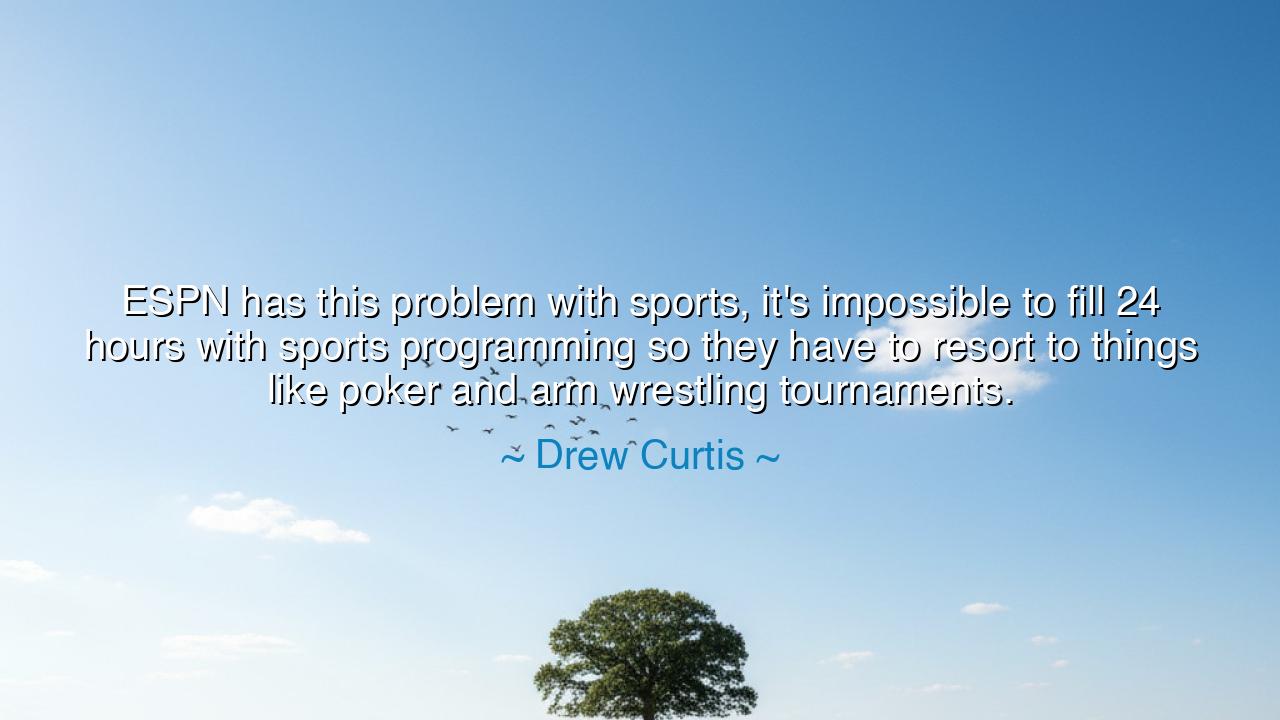
ESPN has this problem with sports, it's impossible to fill 24
ESPN has this problem with sports, it's impossible to fill 24 hours with sports programming so they have to resort to things like poker and arm wrestling tournaments.






Children, gather close, for I bring to you a truth that speaks not only of the nature of entertainment but also of the very essence of human attention and purpose. In the words of Drew Curtis, we hear a reflection on the limits of modern media and the endless thirst for content: "ESPN has this problem with sports, it's impossible to fill 24 hours with sports programming so they have to resort to things like poker and arm wrestling tournaments." These words, though spoken with humor, carry a deeper meaning—a warning about the overconsumption of entertainment and the artificial inflation of what is truly valuable. Curtis highlights the way in which media, in its quest for constant engagement, often fills time with empty spectacle, rather than meaningful, enriching content.
Curtis’s insight points to a profound dilemma of our age: that the hunger for constant stimulation has led to the commodification of anything that can capture attention. Sports, once a pure expression of physical prowess and team spirit, has been stretched and manipulated to fill every moment of the day. Just as the ancients had their own pursuits—like the Olympic Games, which were meant to honor both the gods and the athletes—today’s media often distorts the essence of those pursuits, turning them into something that must always be on, always available, even if it means resorting to less meaningful spectacles like poker or arm wrestling. What was once sacred has become profane, a mere tool to keep the viewer engaged and the advertising dollars flowing.
Think, children, of the great philosophers like Plato who warned against the degradation of truth and knowledge in the face of excess. In his time, Plato saw the Athenian society being distracted by empty entertainment and the glorification of false ideals. He understood that excess, whether in pleasure, wealth, or consumption, leads not to fulfillment, but to emptiness. Just as Curtis laments the superficiality of content like poker tournaments, so too did Plato caution that society’s overindulgence in distractions would rob individuals of their true purpose and wisdom. The true value of sport and entertainment lies not in its ability to fill time, but in its capacity to uplift the spirit, to inspire, and to connect us to something greater than ourselves.
The problem Curtis points to is not just with sports, but with the modern obsession with constant content. The desire to fill every moment with entertainment, no matter the quality, is a reflection of a society’s hunger for distraction. But this desire for endless consumption, whether it’s in the form of arm wrestling or poker, leaves us empty. It is a constant chase for the next moment of excitement, yet none of it leaves us nourished. Think, children, of the great warriors of ancient times, like Hercules or Alexander, who, though warriors of immense strength, also sought purpose in wisdom, strategy, and honor. Their feats were not mere spectacles for amusement but deep actions that embodied their character, their values, and their connection to something greater than the fleeting thrill of victory.
In a similar vein, consider the story of Marcus Aurelius, the great Roman emperor and Stoic philosopher, who, despite his military victories, found his greatest strength in reflection, discipline, and moral clarity. Aurelius did not seek constant stimulation, but rather found peace in stillness and purpose in living according to his principles. He did not fill his days with distractions; rather, he filled them with meaningful action, focused on the betterment of his character and the welfare of the empire. Curtis’s critique of sports programming is a reminder that true value is not found in the endless pursuit of trivial distractions, but in how we choose to fill our time with purpose, meaning, and intentional engagement.
The lesson here, children, is one of mindfulness and intentionality. In a world filled with distractions—where sports, entertainment, and media can so easily consume our attention—it is crucial to remember that not all moments are worthy of our time. Curtis’s critique of constant sports programming reminds us that quantity does not equal quality. True fulfillment is found not in how much we consume, but in the value of what we choose to engage with. The ancients, who placed a high value on wisdom, honor, and reflection, teach us that meaningful living requires discernment, the ability to recognize what is truly valuable and to reject that which is fleeting and superficial.
I charge you now, young ones, to seek purpose in your time and energy. While sports and entertainment can be sources of joy and inspiration, let them not be your sole focus or your constant distraction. Fill your lives with meaningful pursuits, those that challenge your mind, strengthen your spirit, and foster connections with others. Be cautious of the temptation to fill every moment with fleeting excitement—instead, choose activities that feed your soul, that bring you closer to your true purpose, and that align with your highest values. For in the balance of action and stillness, of meaningful engagement and mindful restraint, lies the true strength and fulfillment of a life well-lived.






AAdministratorAdministrator
Welcome, honored guests. Please leave a comment, we will respond soon